41 start with C start with C
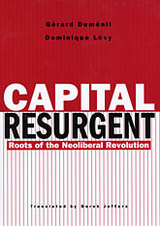
The advent of economic neoliberalism in the 1980s triggered a shift in the world economy. In the three decades following World War II, now considered a golden age of capitalism, economic growth was high and income inequality decreasing. But in the mid-1970s this social compact was broken as the world economy entered the stagflation crisis, following a decline in the profitability of capital. This crisis opened a new phase of stagnating growth and wages, and unemployment. Interest rates as well as dividend flows rose, and income inequality widened.
Economists Gérard Duménil and Dominique Lévy show that, despite free market platitudes, neoliberalism was a planned effort by financial interests against the postwar Keynesian compromise. The cluster of neoliberal policies--including privatization, liberalization of world trade, and reduction in state welfare benefits--is an expression of the power of finance in the world economy.
The sequence of events initiated by neoliberalism was not unprecedented. In the late nineteenth century, when economic conditions were similar to those of the 1970s, a structural crisis led to the first financial hegemony culminating in the speculative boom of the late 1920s. The authors argue persuasively for stabilizing the world economy before we run headlong into another economic disaster.
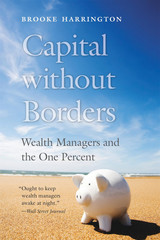
“A timely account of how the 1% holds on to their wealth…Ought to keep wealth managers awake at night.”
—Wall Street Journal
“Harrington advises governments seeking to address inequality to focus not only on the rich but also on the professionals who help them game the system.”
—Richard Cooper, Foreign Affairs
“An insight unlike any other into how wealth management works.”
—Felix Martin, New Statesman
“One of those rare books where you just have to stand back in awe and wonder at the author’s achievement…Harrington offers profound insights into the world of the professional people who dedicate their lives to meeting the perceived needs of the world’s ultra-wealthy.”
—Times Higher Education
How do the ultra-rich keep getting richer, despite taxes on income, capital gains, property, and inheritance? Capital without Borders tackles this tantalizing question through a groundbreaking multi-year investigation of the men and women who specialize in protecting the fortunes of the world’s richest people. Brooke Harrington followed the money to the eighteen most popular tax havens in the world, interviewing wealth managers to understand how they help their high-net-worth clients dodge taxes, creditors, and disgruntled heirs—all while staying just within the letter of the law. She even trained to become a wealth manager herself in her quest to penetrate the fascinating, shadowy world of the guardians of the one percent.

An Economist Book of the Year
A Financial Times Book of the Year
A Foreign Affairs Best Book of the Year
A Prospect Best Book of the Year
A ProMarket Book of the Year
An Omidyar Network “8 Storytellers Informing How We’ve been Reimagining Capitalism” Selection
“Brilliant…Poses all the important questions about our future.”
—Gordon Brown
“A scholar of inequality warns that while capitalism may have seen off rival economic systems, the survival of liberal democracies is anything but assured.”
—The Economist
We are all capitalists now. For the first time in human history, the world is dominated by one economic system. At some level capitalism has triumphed because it works: it delivers prosperity and gratifies our desire for autonomy. But this comes at a moral price, pushing us to treat material success as the ultimate goal, and offers no guarantee of stability. While Western liberal capitalism creaks under the strains of inequality and excess, some are flaunting the virtues of political capitalism, exemplified by China, which may be more efficient, but is also vulnerable to corruption and social unrest.
One of the outstanding economists of his generation, Branko Milanovic mines the data to tell his ambitious and compelling story. Capitalism gets a lot wrong, he argues, but also much right—and it isn’t going away anytime soon. Our task is to improve it in the hopes that a more equitable capitalism can take hold.
“Erudite, illuminating…Engaging to read…As a virtuoso economist, Milanovic is superb when he is compiling and assessing data.”
—Robert Kuttner, New York Review of Books
“Leaves little doubt that the social contract no longer holds. Whether you live in Beijing or New York, the time for renegotiation is approaching.”
—Edward Luce, Financial Times

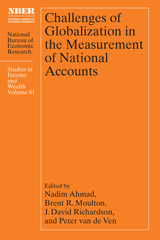
An essential collection at the intersection of globalization, production supply chains, corporate finance regulation, and economic measurement.
The substantial increase in the complexity of global supply chains and other production arrangements over the past three decades has challenged some traditional measures of national income account aggregates and raised the potential for distortions in conventional calculations of GDP and productivity. This volume examines a variety of multinational business activities and assesses their impact on economic measurement. Several chapters consider how global supply chains complicate the interpretation of traditional trade statistics and how new measurement techniques can provide information about global production arrangements. Other chapters examine the role of intangible capital in global production, including the output of factoryless goods producers and the problems of measuring R&D in a globalized world. The studies in this volume also explore potential ways to enhance the quality of the national accounts by improving data collection and analysis and by updating the standards for measurement.
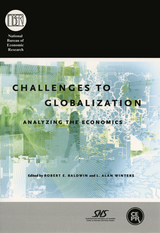
Challenges to Globalization evaluates the arguments of pro-globalists and anti-globalists regarding issues such as globalization's relationship to democracy, its impact on the environment and on labor markets including the brain drain, sweat shop labor, wage levels, and changes in production processes, and the associated expansion of trade and its effects on prices. Baldwin, Winters, and the contributors to this volume look at multinational firms, foreign investment, and mergers and acquisitions and present surprising findings that often run counter to the claim that multinational firms primarily seek countries with low wage labor. The book closes with papers on financial opening and on the relationship between international economic policies and national economic growth rates.

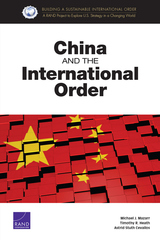

China is fast emerging as a powerful player on the world stage. This book takes a closer look at the country's stance on a range of global issues, arguing that its multipolar diplomacy offers a concrete strategy to constrain the US pursuit of unipolar primacy.
Many people assume that China will follow an imperialistic strategy and therefore be in direct conflict with the American empire in a quest for world domination. Jenny Clegg shows that China is in fact taking a multilateral approach, offering real assistance to developing countries and helping to build the institutions required to run a multipolar world. Without glossing over China's own internal difficulties, the book argues that its international consensus-building strategy could lead to a more peaceful and equitable world.
This book offers a refreshing perspective on China that will be of great value to those interested in the big political questions of how to tackle war and imperialism, globalisation and development as well as to undergraduate students of politics, economics and international relations.

In Chinese Cinema: Identity, Power, and Globalization, a variety of scholars explore the history, aesthetics, and politics of Chinese cinema as the Chinese film industry grapples with its place as the second-largest film industry in the world. Exploring the various ways that Chinese cinema engages with global politics, market forces, and film cultures, this edited volume places Chinese cinema against an array of contexts informing the contours of Chinese cinema today. The book also demonstrates that Chinese cinema in the global context is informed by the intersections and tensions found in Chinese and world politics, national and international co-productions, the local and global in representing Chineseness, and the lived experiences of social and political movements versus screened politics in Chinese film culture.
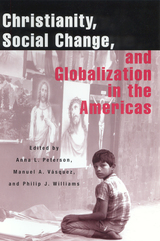
Organized around three central themes-family, youth, and community; democratization, citizenship, and political participation; and immigration and transnationalism-the book argues that, at the local level, religion helps people, especially women and youths, solidify their identities and confront the challenges of the modern world. Religious communities are seen as both peaceful venues for people to articulate their needs, and forums for building participatory democracies in the Americas. Finally, the contributors examine how religion enfranchises poor women, youths, and people displaced by war or economic change and, at the same time, drives social movements that seek to strengthen family and community bonds disrupted by migration and political violence.

Ostherr presents the first in-depth analysis of the public health films produced between World War II and the 1960s that popularized the ideals of world health and taught viewers to imagine the presence of invisible contaminants all around them. She considers not only the content of specific films but also their techniques for making invisible contaminants visible. By identifying the central aesthetic strategies in films produced by the World Health Organization, the Centers for Disease Control, and other institutions, she reveals how ideas about racial impurity and sexual degeneracy underlay messages ostensibly about world health. Situating these films in relation to those that preceded and followed them, Ostherr shows how, during the postwar era, ideas about contagion were explicitly connected to the global circulation of bodies. While postwar public health films embraced the ideals of world health, they invoked a distinct and deeply anxious mode of representing the spread of disease across national borders.



Chakrabarty argues that we must see ourselves from two perspectives at once: the planetary and the global. This distinction is central to Chakrabarty’s work—the globe is a human-centric construction, while a planetary perspective intentionally decenters the human. Featuring wide-ranging excursions into historical and philosophical literatures, The Climate of History in a Planetary Age boldly considers how to frame the human condition in troubled times. As we open ourselves to the implications of the Anthropocene, few writers are as likely as Chakrabarty to shape our understanding of the best way forward.

A new history of globalization and empire at the crossroads of the Pacific.
Located halfway between Hawai‘i and Australia, the islands of Samoa have long been a center of Oceanian cultural and economic exchange. Accustomed to exercising agency in trade and diplomacy, Samoans found themselves enmeshed in a new form of globalization after missionaries and traders arrived in the middle of the nineteenth century. As the great powers of Europe and America competed to bring Samoa into their orbits, Germany and the United States eventually agreed to divide the islands for their burgeoning colonial holdings.
In Coconut Colonialism, Holger Droessler examines the Samoan response through the lives of its workers. Ordinary Samoans—some on large plantations, others on their own small holdings—picked and processed coconuts and cocoa, tapped rubber trees, and built roads and ports that brought cash crops to Europe and North America. At the same time, Samoans redefined their own way of being in the world—what Droessler terms “Oceanian globality”—to challenge German and American visions of a global economy that in fact served only the needs of Western capitalism. Through cooperative farming, Samoans contested the exploitative wage-labor system introduced by colonial powers. The islanders also participated in ethnographic shows around the world, turning them into diplomatic missions and making friends with fellow colonized peoples. Samoans thereby found ways to press their own agendas and regain a degree of independence. Based on research in multiple languages and countries, Coconut Colonialism offers new insights into the global history of labor and empire at the dawn of the twentieth century.
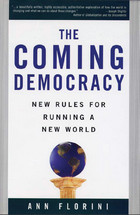
National governments are proving ill-equipped to manage an increasingly complicated suite of global problems, from infectious diseases to climate change to conflicts over international trade. In The Coming Democracy, leading political analyst Ann Florini sets forth a compelling new paradigm for transnational governance, one based on the concept of “transparency”— the idea that the free flow of information (on topics ranging from corporate and government behavior to nuclear proliferation to biodiversity protection) provides powerful ways to hold decision makers accountable and to give ordinary people meaningful voice in shaping the policies that affect them. Dramatic breakthroughs in information technology of the past decade have made such transparency possible on a global scale.
Florini offers a clear and comprehensive assessment of the possibilities for using transparency to develop effective approaches to transnational governance. She shows how this new form of governance promises real hope for managing global problems, and provides a compelling scenario that demonstrates how existing conventions and institutions can lead the way in the evolution of a better system of global governance.

When Empire appeared in 2000, it defined the political and economic challenges of the era of globalization and, thrillingly, found in them possibilities for new and more democratic forms of social organization. Now, with Commonwealth, Michael Hardt and Antonio Negri conclude the trilogy begun with Empire and continued in Multitude, proposing an ethics of freedom for living in our common world and articulating a possible constitution for our common wealth.
Drawing on scenarios from around the globe and elucidating the themes that unite them, Hardt and Negri focus on the logic of institutions and the models of governance adequate to our understanding of a global commonwealth. They argue for the idea of the “common” to replace the opposition of private and public and the politics predicated on that opposition. Ultimately, they articulate the theoretical bases for what they call “governing the revolution.”
Though this book functions as an extension and a completion of a sustained line of Hardt and Negri’s thought, it also stands alone and is entirely accessible to readers who are not familiar with the previous works. It is certain to appeal to, challenge, and enrich the thinking of anyone interested in questions of politics and globalization.
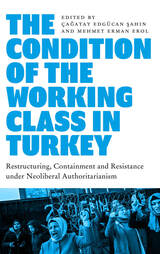
Decades of neoliberal authoritarianism have propelled Turkey into crisis. Regime change, economic disaster and Erdogan’s ambition to impose ‘one-man rule’ have shaken the foundations of Turkish political life, but what does this mean for workers?
Moving beyond the headlines and personalities, this book uncovers the real condition of the working class in modern Turkey. Combining field research and in-depth interviews, it offers cutting-edge analyses of workplace struggles, trade unionism, the AKP’s relationship with neoliberalism, migration, gender, agrarian change and precarity, as well as the Covid-19 pandemic and its impact on workers.
Bringing together Turkish activists and scholars, this book is an inside look at the dynamics and contradictions of working-class resistance against Turkey’s neoliberal authoritarian regime; from worker self-management to organized labor and rural struggles.




Contemporary Arab Thought is a complex term, encompassing a constellation of social, political, religious and ideological ideas that have evolved over the past two hundred years — ideas that represent the leading positions of the social classes in modern and contemporary Arab societies.
Distinguished Islamic scholar Ibrahim Abu-Rabi‘ addresses such questions as the Shari‘ah, human rights, civil society, secularism and globalization. This is complimented by a focused discussion on the writings of key Arab thinkers who represent established trends of thought in the Arab world, including Muhammad ‘Abid al-Jabiri, Adallah Laroui, Muhammad al-Ghazali, Rashid al-Ghannoushi, Qutatnine Zurayk, Mahdi ‘Amil and many others.
Before 1967, some Arab countries launched hopeful programmes of modernisation. After the 1967 defeat with Israel, many of these hopes were dashed. This book retraces the Arab world’s aborted modernity of recent decades. Abu-Rabi‘ explores the development of contemporary Arab thought against the historical background of the rise of modern Islamism, and the impact of the West on the modern Arab world.

Louis Mandrin led a gang of bandits who brazenly smuggled contraband into eighteenth-century France. Michael Kwass brings new life to the legend of this Gallic Robin Hood and the thriving underworld he helped to create. Decades before the storming of the Bastille, surging world trade excited a revolution in consumption that transformed the French kingdom. Contraband exposes the dark side of this early phase of globalization, revealing hidden connections between illicit commerce, criminality, and popular revolt.
France's economic system was tailor-made for an enterprising outlaw like Mandrin. As French subjects began to crave colonial products, Louis XIV lined the royal coffers by imposing a state monopoly on tobacco from America and an embargo on brilliantly colored calico cloth from India. Vigorous black markets arose through which traffickers fed these exotic goods to eager French consumers. Flouting the law with unparalleled panache, Mandrin captured widespread public attention to become a symbol of a defiant underground.
This furtive economy generated violent clashes between gangs of smugglers and customs agents in the borderlands. Eventually, Mandrin was captured by French troops and put to death in a brutal public execution intended to demonstrate the king's absolute authority. But the spectacle only cemented Mandrin's status as a rebel folk hero in an age of mounting discontent. Amid cycles of underground rebellion and agonizing penal repression, the memory of Mandrin inspired ordinary subjects and Enlightenment philosophers alike to challenge royal power and forge a movement for radical political change.
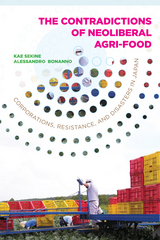
Sekine and Bonanno stress the incompatibility of the requirements of neoliberalism with the structural and cultural conditions of Japanese agri-food. Local farmers’ and fishermen’s emphasis on community collective management of natural resources, they argue, clashes with neoliberalism’s focus on individualism and competitiveness. The authors conclude by pointing out the resulting fundamental contradiction: The lack of recognition of this incompatibility allows the continuous implementation of market solutions to problems that originate in these very market mechanisms.
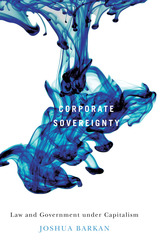
Refinery explosions. Accounting scandals. Bank meltdowns. All of these catastrophes—and many more—might rightfully be blamed on corporations. In response, advocates have suggested reforms ranging from increased government regulation to corporate codes of conduct to stop corporate abuses. Joshua Barkan writes that these reactions, which view law as a limit on corporations, misunderstand the role of law in fostering corporate power.
In Corporate Sovereignty, Barkan argues that corporate power should be rethought as a mode of political sovereignty. Rather than treating the economic power of corporations as a threat to the political sovereignty of states, Barkan shows that the two are ontologically linked. Situating analysis of U.S., British, and international corporate law alongside careful readings in political and social theory, he demonstrates that the Anglo-American corporation and modern political sovereignty are founded in and bound together through a principle of legally sanctioned immunity from law. The problems that corporate-led globalization present for governments result not from regulatory failures as much as from corporate immunity that is being exported across the globe.
For Barkan, there is a paradox in that corporations, which are legal creations, are given such power that they undermine the sovereignty of states. He notes that while the relationship between states and corporations may appear adversarial, it is in fact a kind of doubling in which state sovereignty and corporate power are both conjoined and in conflict. Our refusal to grapple with the peculiar nature of this doubling means that some of our best efforts to control corporations unwittingly reinvest the sovereign powers they oppose.

"Elegantly written and sharply argued, Nick Robins' gripping account of the rise and fall of the English East India Company brings to life a crucial episode in the history of globalization."—Sankar Muthu, University of Chicago
The English East India Company was the mother of the modern multinational. Its trading empire encircled the globe, importing Asian luxuries such as spices, textiles, and teas. But it also conquered much of India with its private army and broke open China's markets with opium. The Company's practices shocked its contemporaries and still reverberate today, offering lessons about unfettered capitalism, corporate responsibility, and the legacy of colonialism.
The Corporation That Changed the World is the first book to reveal the Company's enduring legacy as a corporation. This expanded edition explores how the four forces of scale, technology, finance, and regulation drove its spectacular rise and fall. For decades, the Company was simply too big to fail, and stock market bubbles, famines, drug-running, and even duels between rival executives are to be found in this new account.
Table of Contents:
Introduction
Chronology
1 The Hidden Wound
2 The Imperious Company
3 Out of the Shadows
4 The Bengal Revolution
5 The Great East Indian Crash
6 Regulating the Company
7 Justice Will Be Done
8 The Toxic Exchange
10 The Unfettered Business
Epilogue
For Robins, the Company's story provides vital lessons on both the role of corporations in world history and the steps required to make global business accountable today.
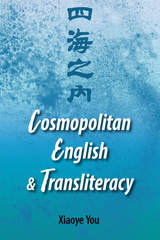
Despite the vast number of multilingual speakers in the United States and the pervasive influence of globalization, writing studies in this country is still inextricably linked to a nationalistic, monolingual English ideology. In Cosmopolitan English and Transliteracy, Xiaoye You addresses this issue by proposing that writing studies programs adopt a cosmopolitan perspective. Emphasizing local and global forms of citizenship and identification, You merges a humanistic vision with the rigor of social science, arguing that linguistic and cultural differences can be explored to recover human connections normally severed by geographical and semiotic borders.
You examines several areas of writing affected by globalization. He then turns to the composition classroom, highlighting the challenges and possibilities of crossing cultural boundaries in academic discourse before introducing a pedagogy aimed at fostering American students’ translingual and transcultural sensibilities. Included is a model for training writing teachers in the context of globalization, which aims to help instructors gain practical knowledge about the needs and resources of multilingual writers through communication technologies and cross-cultural partnerships.
By introducing cosmopolitan perspectives into the composition classroom, You challenges traditional assumptions about language, identity, and literacy as they relate to writing studies. Innovative and provocative, Cosmopolitan English and Transliteracy charts a new way forward for writing programs, with a call to focus on global rather than national identity.


Winner of the United Association for Labor Education Book Award 2021, this is essential reading for everyone who wants to understand the role of Amazon in our economy and society. With Amazon, supply-chain, and unionization in the news, it is both timely and incredibly informative.
Amazon is the most powerful corporation on the planet and its CEO, Jeff Bezos, has become one of the richest individuals in history, and one of the few people to profit from a global pandemic. Its dominance has reshaped the global economy itself: we live in the age of “Amazon Capitalism.”
“One-click” instant consumerism and its immense variety of products has made Amazon a worldwide household name, with over 60% of US households subscribing to Amazon Prime. In turn, these subscribers are surveilled by the corporation. Amazon is also one of the world's largest logistics companies, resulting in weakened unions and lowered labor standards.
The company has also become the largest provider of cloud-computing services and home surveillance systems, not to mention the ubiquitous Alexa.
With cutting-edge analyses, this book looks at the many dark facets of the corporation, including automation, surveillance, tech work, workers' struggles, algorithmic challenges, the disruption of local democracy and much more. The Cost of Free Shipping shows how Amazon represents a fundamental shift in global capitalism that we should name, interrogate, and be primed to resist.
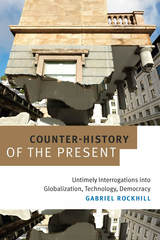


Harold James examines the vulnerability and fragility of processes of globalization, both historically and in the present. This book applies lessons from past breakdowns of globalization—above all in the Great Depression—to show how financial crises provoke backlashes against global integration: against the mobility of capital or goods, but also against flows of migration. By a parallel examination of the financial panics of 1929 and 1931 as well as that of 2008, he shows how banking and monetary collapses suddenly and radically alter the rules of engagement for every other type of economic activity.
Increased calls for state action in countercyclical fiscal policy bring demands for trade protection. In the open economy of the twenty-first century, such calls are only viable in very large states—probably only in the United States and China. By contrast, in smaller countries demand trickles out of the national container, creating jobs in other countries. The international community is thus paralyzed, and international institutions are challenged by conflicts of interest. The book shows the looming psychological and material consequences of an interconnected world for people and the institutions they create.

This book argues that the current financial turmoil signals a crisis in globalisation that will directly challenge the free market economic model.
Graham Turner shows that the housing bubbles in the West were deliberately created to mask the damage inflicted by companies shifting production abroad in an attempt to boost profits. As these bubbles burst, economic growth in many developed countries will inevitably tumble. The Japanese crisis of the 1990s shows that banks and governments may struggle to contain the fallout. The problem has not been limited to the US, UK and Europe: housing bubbles have become endemic across wide swathes of emerging market economies. As the West slides, these countries will see an implosion of their credit bubbles too, shaking their faith in the free market.
Turner is an experienced and successful economic forecaster, whose opinions are sought by large international banks and top financial journalists. Drawing from his first hand experience of the Japanese property crash of the 1990s, he presents his analysis in a clear and persuasive style, showing that the end of housing market growth spells disaster for neoliberal globalisation.

How can Cuba address the challenges of economic development and transformation that have bedeviled so many Latin American and Eastern European countries? What are the universally common macroeconomic and societal challenges it faces and the specific peculiarities that have emerged after a decade-long transformation of its economy?
For the Cuban and American social scientists and policy experts writing in this timely and provocative volume, the answer lies in examining Cuba’s development trajectory by delving into issues ranging from the political economy of reform to their impact on specific sectors including export development, foreign direct investment, and U.S.–Cuba trade. Moreover, the volume also draws attention to the intersection between economic reform and societal dynamics by exploring changes in household consumption, socioeconomic mobility, as well as remittances and their effects, while remaining steadfast in its focus on their policy implications for Cuba’s future.

While most books and articles on Cuba seek to analyse the island’s socialist experiment from the perspective of internal dynamics or international relations, this book attempts to understand the revolutionary process as part of a counter-current against neoliberal globalisation.
Rather than presenting Cuba as a socialist survivor, whose performance must be measured against the standards set by the ‘international community’, George Lambie judges Cuban socialism on the goals which the revolution sets for itself. He shows that despite Cuba’s isolation in the ‘New World Order’, and the enormous pressures it has faced to ‘conform’, its faith in an alternative socialist project has continued and grown.
Now that neoliberalism is in crisis, Cuba’s promotion of socialist values is finding a renewed relevance. In this fascinating study Lambie argues that Cuba is again becoming a symbol, and practical example, of socialism in action. This book is essential reading for students of politics and Latin American studies.

In Cultivating Knowledge anthropologist Andrew Flachs shows how rural farmers come to plant genetically modified or certified organic cotton, sometimes during moments of agrarian crisis. Interweaving ethnographic detail, discussions of ecological knowledge, and deep history, Flachs uncovers the unintended consequences of new technologies, which offer great benefits to some—but at others’ expense. Flachs shows that farmers do not make simple cost-benefit analyses when evaluating new technologies and options. Their evaluation of development is a complex and shifting calculation of social meaning, performance, economics, and personal aspiration. Only by understanding this complicated nexus can we begin to understand sustainable agriculture.
By comparing the experiences of farmers engaged with these mutually exclusive visions for the future of agriculture, Cultivating Knowledge investigates the human responses to global agrarian change. It illuminates the local impact of global changes: the slow, persistent dangers of pesticides, inequalities in rural life, the aspirations of people who grow fibers sent around the world, the place of ecological knowledge in modern agriculture, and even the complex threat of suicide. It all begins with a seed.

Based in North and South America, scholars from fields including anthropology, performance studies, history, literature, and communications studies explore specific variations of cultural agency across Latin America. Contributors reflect, for example, on the paradoxical programming and reception of a state-controlled Cuban radio station that connects listeners at home and abroad; on the intricacies of indigenous protests in Brazil; and the formulation of cultural policies in cosmopolitan Mexico City. One contributor notes that trauma theory targets individual victims when it should address collective memory as it is worked through in performance and ritual; another examines how Mapuche leaders in Argentina perceived the pitfalls of ethnic essentialism and developed new ways to intervene in local government. Whether suggesting modes of cultural agency, tracking exemplary instances of it, or cautioning against potential missteps, the essays in this book encourage attentiveness to, and the multiplication of, the many extraordinary instantiations of cultural resourcefulness and creativity throughout Latin America and beyond.
Contributors. Arturo Arias, Claudia Briones, Néstor García Canclini, Denise Corte, Juan Carlos Godenzzi, Charles R. Hale, Ariana Hernández-Reguant, Claudio Lomnitz, Jesús Martín Barbero, J. Lorand Matory, Rosamel Millamán, Diane M. Nelson, Mary Louise Pratt, Alcida Rita Ramos, Doris Sommer, Diana Taylor, Santiago Villaveces
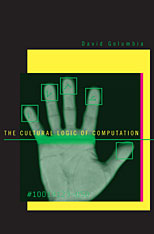
Advocates of computers make sweeping claims for their inherently transformative power: new and different from previous technologies, they are sure to resolve many of our existing social problems, and perhaps even to cause a positive political revolution.
In The Cultural Logic of Computation, David Golumbia, who worked as a software designer for more than ten years, confronts this orthodoxy, arguing instead that computers are cultural “all the way down”—that there is no part of the apparent technological transformation that is not shaped by historical and cultural processes, or that escapes existing cultural politics. From the perspective of transnational corporations and governments, computers benefit existing power much more fully than they provide means to distribute or contest it. Despite this, our thinking about computers has developed into a nearly invisible ideology Golumbia dubs “computationalism”—an ideology that informs our thinking not just about computers, but about economic and social trends as sweeping as globalization.
Driven by a programmer’s knowledge of computers as well as by a deep engagement with contemporary literary and cultural studies and poststructuralist theory, The Cultural Logic of Computation provides a needed corrective to the uncritical enthusiasm for computers common today in many parts of our culture.

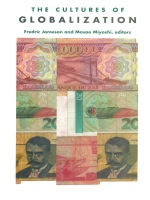
Discussing overlapping themes of transnational consequence, the contributors to this volume describe how the global character of technology, communication networks, consumer culture, intellectual discourse, the arts, and mass entertainment have all been affected by recent worldwide trends. Appropriate to such diversity of material, the authors approach their topics from a variety of theoretical perspectives, including those of linguistics, sociology, economics, anthropology, and the law. Essays examine such topics as free trade, capitalism, the North and South, Eurocentrism, language migration, art and cinema, social fragmentation, sovereignty and nationhood, higher education, environmental justice, wealth and poverty, transnational corporations, and global culture. Bridging the spheres of economic, political, and cultural inquiry, The Cultures of Globalization offers crucial insights into many of the most significant changes occurring in today’s world.
Contributors. Noam Chomsky, Ioan Davies, Manthia Diawara, Enrique Dussel, David Harvey, Sherif Hetata, Fredric Jameson, Geeta Kapur, Liu Kang, Joan Martinez-Alier, Masao Miyoshi, Walter D. Mignolo, Alberto Moreiras, Paik Nak-chung, Leslie Sklair, Subramani, Barbara Trent
READERS
Browse our collection.
PUBLISHERS
See BiblioVault's publisher services.
STUDENT SERVICES
Files for college accessibility offices.
UChicago Accessibility Resources
home | accessibility | search | about | contact us
BiblioVault ® 2001 - 2024
The University of Chicago Press









